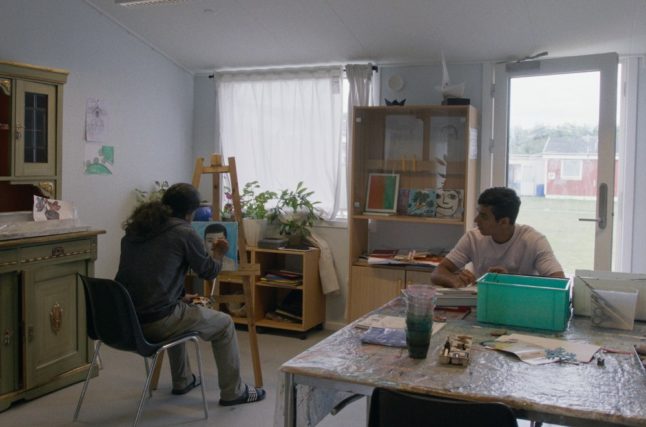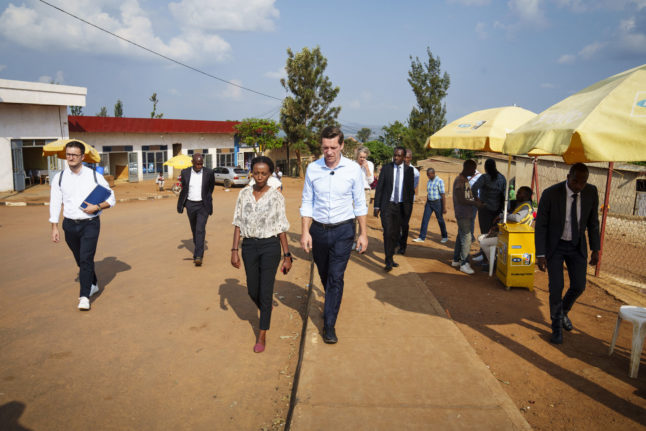The Painter’s Room, a 23-minute documentary short film, was filmed at the Kærshovedgård ‘expulsion centre’ in central Jutland in summer 2022.
Located 13 kilometres from Ikast in Jutland, the Kærshovedgård facility is one of two deportation centres in Denmark used to house rejected male and female asylum seekers who have not agreed to voluntary return, as well as persons with so-called ‘tolerated stay’ (tålt ophold) status.
The residents do not have permission to reside in Denmark but many cannot be forcibly deported because Denmark has no diplomatic relations or return agreements with their home countries.
Kærshovedgård houses people who have not committed crimes but have no legal right to stay in Denmark, for example due to a rejected asylum claim; as well as foreign nationals with criminal records who have served their sentences but are awaiting deportation.
It first became prominent in the mid-2010s, when it received criticism for imposing conditions that could lead to mental illnesses in residents.
READ ALSO: The middle of nowhere: Inside Denmark’s Kærshovedgård deportation camp
While the controversial centre has been the subject of media reporting and newspaper articles, it has not previously been the focus of a film.
The Spanish director of The Painter’s Room, Maria Colomer, told The Local she first got the idea to make a documentary about the centre after visiting it as a volunteer.
“I went to Kærshovedgård because I was part of a group called Contact Network where each of us had a contact in Kærshovedgård and we were helping with legal things or just being emotionally there for them.
“And what I discovered was that some people had been there for an unimaginably long amount of time, and the only way to survive in that unbearable situation was by having patience and finding a way to keep their lives going,” she said.
The documentary focuses on individual residents like Artin, a young Iranian bodybuilder, and Jahan, a Kurdish man who recently discovered his talent for painting.
“The documentary shows part of Artin’s and Jahan’s lives, two nice humans who, despite their seemingly hopeless future, try to find ways to bring hope into their lives and the people around them,” Colomer said.
The Painter’s Room | Official trailer – English subtitles from Boogaloo Films on Vimeo.
Finding residents who would agree to appear in the documentary was one of the easier parts of a film-making process that became increasingly difficult over time, she said.
“We had a queue of people who wanted to participate. But what they didn’t understand in the beginning is that we’re not journalists. So we don’t want just an interview. We want to be there with them,” she said.
Some officers at the facility, which is operated by Denmark’s prison service Kriminalforsorgen, became increasingly sceptical about the film team according to Colomer.
“At first they thought it was a small students’ project. So we were given permission to film inside, and then they realised that we kept on going and it was not going to be a five minute video on YouTube,” she said.
Management and officers at the centre then took on a “different character”, the filmmaker said.
“They started putting limitations so we couldn’t film in any of the common spaces. We couldn’t film outside in the centre. Luckily we have some shots from before they got scared. And because they said yes in the beginning, we had the permission to enter with cameras even when they realised what we were actually doing,” she said.
One of the aims of the documentary is to provide a more in-depth portrayal of life in Kærshovedgård than what has been seen by the Danish public up to now, she said.
“We are highlighting not so much that they are put in an unbearable situation [because Denmark] wants to make them leave, it’s more about showing the face and the name of who is there, so when especially the Danish audience hears about Kærshovedgård, they can imagine who lives there when we talk about this place,” she said.
“So this is the main goal, and the only thing that we also highlight is the indefinite detention time,” she said.
Colomer explained that she had hoped to show the film at Copenhagen’s CPH:Dox documentary film festival, but that it had not been accepted, so the team hopes it can be selected for another Danish film festival.
The film, produced by Boogaloo Films (Spain) and Got Fat Productions (Denmark) and distributed by More Than Films is set to premiere at the Málaga Film Festival on March 7th. You can view the trailer with English subtitles here.
“My hope was to focus mainly on the Danish audience, but since the beginning, I realised that – unfortunately – the film attracts more international interest than Danish,” Colomer said.



 Please whitelist us to continue reading.
Please whitelist us to continue reading.
Member comments